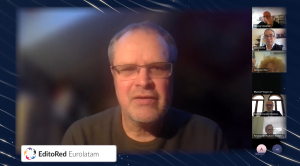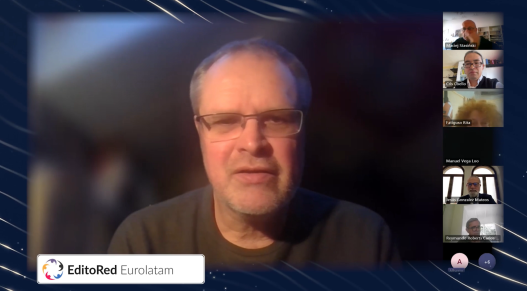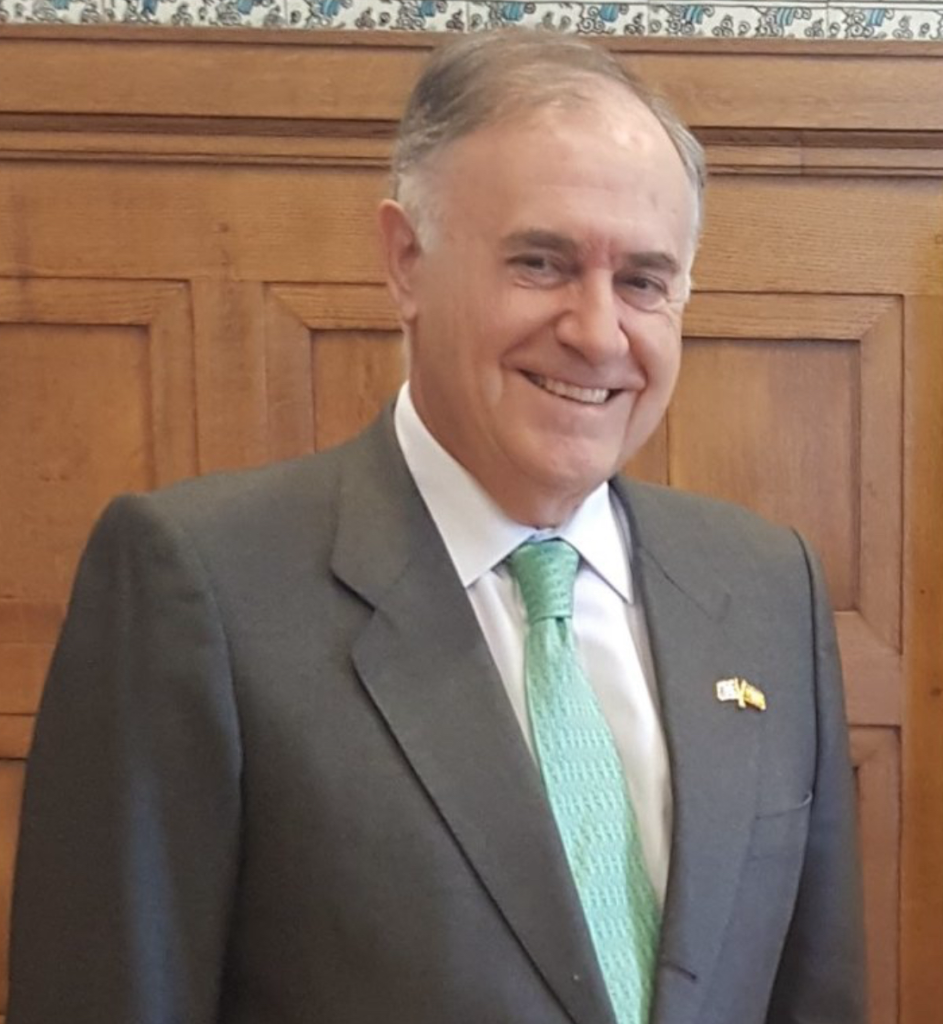
'NO ONE BELIEVES THAT FREEDOM IS FREE', SAYS LITHUANIAN ELF FIGHTING RUSSIAN TROLLS
Giedrius Sakalauskas is the visible face of a movement dedicated to disproving the information that Russian troll farms produce. Officially, he is the director of the Civic Resilience Center / Res Publica. Unofficially, he is the coordinator of the Elves, which, as he explains, are “online volunteers” dedicated to confronting these trolls.
In a webinar organized by EditoRed, Sakalauskas told how they develop this informative fight.
How did they start, what is the “battlefield”, do they have ‘elves’ in Latin America, is AI a weapon for or against, why the fight should no longer consist only of confronting lies? These and other questions were posed to Sakaluskas by media editors from Europe and Latin America, members of EditoRed.
The complete conversation can be seen in this video. You can also find it on Canal Europa.
HOW THE ELVES WERE BORN
Res Publica was founded in 2014, when Russia invaded Crimea, Ukraine. Sakalauskas tells that when that event took place, Russian propaganda immediately appeared and started attacking Lithuanian media. Lithuania was part of the Soviet Union and the first of the former Soviet countries to join the European Union.
Ten years ago, trolls acted by writing comments under the news published by the media on their websites. “We saw that 80% of the comments were negative, saying that Lithuania was occupied by NATO and that the European Union was a failed project. Our decision was quite simple: to try to change that situation in the comments section itself.”
Sakalauskas says that the “elves” started posting positive comments and that, he says, made it possible to change the situation quite quickly, in about three months.
Then, the “battlefield” moved elsewhere: to social networks. To Facebook especially.
“In Lithuania, if you’re not on Facebook, you don’t exist; that’s still the case today. Facebook is still the main battlefield in our country,” he explains.
From 40 friends who started this voluntary task, they grew to a much larger group (4,000 according to information previously published by Res Publica), organized in Facebook groups or pages. The strategy for this growth was simple: friends inviting other friends.
As a result, the “elves” mostly don’t know each other in person. “That’s good. The less you know, the safer you are,” says Sakaluskas.
In the beginning, everyone did everything from monitoring trolls to campaigning. Ten years later, the elves include financial experts, professional fact-checkers. And, given the circumstances, they are now concentrating primarily on supporting Ukraine.
Its members include people from European Union countries, such as Lithuania, Latvia and Poland; there are also people from Ukraine, Moldova and Georgia, among others.
“We still stand as a web-based network, acting especially on Facebook, in different groups and different pages, with a secret brain center that coordinates everything,” explains Sakaluskas, who is also the movement’s sole spokesperson.
EDITORS ASK QUESTIONS
In the webinar, editors from various media outlets posed questions to Sakalauskas. Here are some of them:
Maciej Stasiński (from Gazeta Wyborcza, Poland): do you have a list of trolls operating from Russia, how many of them are active, in which countries do they operate?
When we started, posting comments on Lithuanian news portals, we managed to determine that thousands of negative comments were produced from a few IP accounts (Internet terminals). One IP could be in charge of about 20 Facebook profiles and produce a thousand negative comments, from trolls. At that time, we found 12 IPs doing that.
Now we don’t just have trolls acting from Russia. Now we have mainly local “useful idiots”. We can’t prove if they are being paid by Russia, but, definitely, we can see that they are very well coordinated from Russia because of the kind of campaigns they run, because they take their narratives. It’s not something chaotic, it’s something organized. They always take a narrative and start spreading it.
My theory is that, as a precaution, the St. Petersburg troll farms are targeted towards countries like the United States, France, Great Britain, and that for small countries, unfortunately, there are enough local “useful idiots.”
We have a list of the “toxic profiles” and we are trying to stop the lies they spread. Because there are no opinions there, they are just open lies.
Maciej Stasiński: Do you cooperate with the center that the European Union set up to deal with fake news and propaganda? That center was formed to define who and for what purpose is behind this global and massive propaganda.
No, locally we cooperate very well and formally with the Lithuanian StratCom (StratCom is a team of the European External Action Service) and with academia. I think it is a very good example of the united fight against a hostile propaganda, when the state organization, the grassroots movement like us, the academy, private initiatives work hand in hand with a European center to fight disinformation. I was invited once for a training, mainly for people from post-Soviet countries. We have some unofficial cooperation, but not so strongly established.
Jesús González (from Aquí Europa and Canal Europa): Are the elves anonymous? What risks do they run?
No, not at all. Elves are exemplary people, some of them scientists, others are journalists, they have families… It is the trolls who do not have names and, thus, make attacks against elves. For example, a year ago my account was deleted from Facebook, because I was massively reported. And the Ukrainian friends made the request to Facebook to get it back. They can do that kind of affectation because when we do campaigns, we act with our real Facebook profile, because that’s a civic position, to say frontally to somebody “don’t do that.”
Rita Fatiguso (from Il Sole 24 Ore): What do you think about “Extinction Rebellion”?
I’m sorry, I don’t know them.
Rita Fatiguso: It is a group very well known all over the world. They have made many acts against monuments, against museums, many protests of this kind to emphasize environmental problems.
Now I know what you are talking about. We are from different tribes. We act mainly on the internet and we don’t do that kind of aggressive actions or insulting attacks. We try to be polite. The way we try to explain that some thing that is posted is not true is different from what you are talking about.
Rita Fatiguso: But the goal is to focus the opinion on some facts. So maybe that’s the same thing you’re looking for.
Rita Fatiguso: It probably is. But we do it in a different way.
Maciej Stasiński: Have you been able to determine the impact of troll campaigns on society, on politics, for example, within Lithuania? Was troll propaganda able to tilt public opinion in one direction or another?
We don’t have tools to measure when we run campaigns. (…)
Maciej Stasiński: But trolls have been trying to influence public opinion within Lithuania since they started operating?
Yes, of course. They have thousands of narratives. They are trying to use every possible means to generate confrontation in society. We are trying to be there and we are trying to confront them, to stop them, to get them off Facebook. And I can say we are doing quite well. But in elections, I don’t know; in Lithuania, we have never had an openly pro-Russian party, which means that we always face that main narrative that Lithuania is a failed country, that it is occupied by NATO soldiers.
But my main idea now is that we have to stop discrediting, no longer do what I call Kremlin ping pong: they throw something and we confront. I think we should no longer engage only in that.
In all our countries we have to start telling our narrative. Because we are a real success. The European Union is a real success story. We have thousands of success stories in front of Russia. What about them? They should be proud that they are killing good people? We should be proud that we are part of civilization.
Alberto Rubio (from The Diplomat in Spain): Do you have any kind of strategy for the new generations, who seem to be more willing to believe unbelievable stories, sometimes fake news of this kind?
I think, as always, the main thing is: education, education, education and more education for young people. And what we need to teach is media literacy, critical thinking. And – I’m not afraid of the word propaganda – we have to use “white propaganda,” saying who we are and what we are fighting for.
We have to be direct. Democracy is now under attack not only by Russia, but also by China, by Iran, by North Korea and they are using our weaknesses. What are our weaknesses? Because we are liberals, we respect any opinion, but what they are throwing at us are not opinions, they are throwing lies at us and the young generation, which is not yet fully formed, is accepting them quite easily.
We must invest money in the education of young people to defend them, to teach them that freedom is not free.
Carlos Mora (from EditoRed): How is “Res Publica” financed?
Res Publica is an NGO and is financed like all NGOs, with grants to projects that apply for funding. We do not have permanent funding, we go from grant to grant, from project to project. We are fighting day and night. Sometimes we are unemployed, sometimes employed. We are all volunteers.
I’m not saying “give me 5 euros and I’ll fight for freedom”. No, but funding is necessary to fight in a more professional way. We have better experts to do better research.
Carlos Mora: how close or far do you think you are from winning this war against propaganda?
You know, when I was young, about 20 years ago, there was a pub in Vilnius that I sometimes went to. When you were leaving the pub you could see a sign that said “Tomorrow the beer is free.” We all liked that tomorrow was free. I can say “Tomorrow we will have beaten the bad guys”. But, unfortunately, I don’t know the exact date when that will happen. That’s a pretty abstract answer, but I’m a chronic optimist. I do believe in fairy tales.
Mathieu Bion (from Agence Europe): Do you think that the new rules at the European level regarding technological platforms and the control they should have over content is sufficient? What contacts do you have with Twitter, for example, or with other social networks like this one?
With Twitter we have no contacts here in Lithuania. Here, Twitter doesn’t mean anything. But with Facebook, we have very strong discussions sometimes, because they allow publishing bad content and, moreover, they banned us from supporting Ukraine and the LGBT community.
But I understand Facebook. It’s not easy. It’s a huge platform. I tell you this: I was in Singapore and some people were interested in how to fight disinformation, how to engage society in it, and about four years ago Singapore introduced a law on how to cooperate, for example, with Facebook to remove toxic content immediately. At that time, Singaporeans were afraid that that would be frowned upon by democratic countries. Now I see that they have a very good contract and can stop lies immediately.
In general, I think we have to work according to European law, but we also have to work closely with the platforms to stop disinformation.
The problem now is that we have the same disinformation, but a high speed of dissemination. Unfortunately, those who create disinformation are trying to use Artificial Intelligence for their goals. So, I’m not afraid to bring it up, why can’t we use Artificial Intelligence against this disinformation?
We can use it against them. And as I said, we have to cooperate with the platforms firmly, especially the European Union, which has a great power really. But we have to use that power by discussing with them the issue of how to stop this disinformation.
Carlos Mora: Russian propaganda is also in Latin America, does Res Publica have links with Latin America?
We tried four years ago, before COVID. We had a project funded by us to go to Colombia and do training for potential audiences. But then the COVID pandemic started. Honestly, I have no contacts in Latin America. We are not Che Guevara, we don’t go and make the Revolution in another continent. If someone from Latin America would like to join, if someone is really interested, we can help, we can give training, but we are not “exporting”.
Jesús González: If someone wanted to be part of the “elves”, what elements should they know?
We don’t have strict rules. If you come, I don’t know, from a foreign organization from Spain, from an NGO, you can join our academy. If you are really good, we accept you. We keep adding people from more nations. The last forum we had was in Georgia with people from two more countries, Bulgaria and Moldova. And we have our small organizations in Germany and in the Netherlands, which are not a mass movement, but you know, you don’t need to have a mass movement. What you need is a group of dedicated people, who can work together with people from other countries.
I think the most important thing is that something starts, you have to do something, if you don’t do anything, it’s zero, if you do something, it could be a bad result, a good result or a very good result. And whatever that result is, never give up. We have to fight for our freedom, for democracy.
Nobody, please, believe that freedom is free, never; in Lithuania we were under Soviet occupation for 50 years. So we know how terrible that is. You know, we have to unite.
————
This text is free to use. If you use it, please cite EditoRed.



